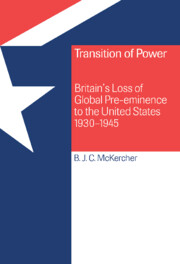Book contents
- Frontmatter
- Contents
- Acknowledgments
- List of abbreviations
- Prologue: Power and purpose in Anglo-American relations, 1919–1929
- 1 The end of Anglo-American naval rivalry, 1929–1930
- 2 The undermining of war debts and reparations, 1929–1932
- 3 Disarmament and security in Europe and the Far East, 1930–1932
- 4 The unravelling of co-operation, 1932–1933
- 5 Moving away from the United States, 1933–1934
- 6 Britain, the United States, and the global balance of power, 1934–1935
- 7 From Abyssinia to Brussels via London, Madrid, and Peking, 1935–1937
- 8 Appeasement, deterrence, and Anglo-American relations, 1938–1939
- 9 Belligerent Britain and the neutral United States, 1939–1941
- Epilogue: ‘A new order of things’, 1941–1945
- Select Bibliography
- Index
Prologue: Power and purpose in Anglo-American relations, 1919–1929
Published online by Cambridge University Press: 15 July 2009
- Frontmatter
- Contents
- Acknowledgments
- List of abbreviations
- Prologue: Power and purpose in Anglo-American relations, 1919–1929
- 1 The end of Anglo-American naval rivalry, 1929–1930
- 2 The undermining of war debts and reparations, 1929–1932
- 3 Disarmament and security in Europe and the Far East, 1930–1932
- 4 The unravelling of co-operation, 1932–1933
- 5 Moving away from the United States, 1933–1934
- 6 Britain, the United States, and the global balance of power, 1934–1935
- 7 From Abyssinia to Brussels via London, Madrid, and Peking, 1935–1937
- 8 Appeasement, deterrence, and Anglo-American relations, 1938–1939
- 9 Belligerent Britain and the neutral United States, 1939–1941
- Epilogue: ‘A new order of things’, 1941–1945
- Select Bibliography
- Index
Summary
The Americans seem to me to have made the great mistake of taking for granted that what suited them & seemed just to them must at once appear equally suitable & just to all the world.
Austen Chamberlain, August 1927This is a study of power. More particularly, it is a study of how power has been lost and won in international politics, of how Great Britain, the greatest of the great Powers in 1930, came to surrender its pre-eminence to the United States by the end of the Second World War. In this context, it shows how British leaders responded to the American question in their diplomacy; and why the British side of this relationship evolved as it did. What constitutes ‘power’ is a vexed question. Political scientists have devised theoretical models to find an answer; but in the recent words of one of them: ‘Even if they were substantially correct, these statements would not be very satisfying, if only because all forms of guessing are not equally imprecise.’ For thirty years, international historians have embarked on the same crusade, particularly American ‘revisionists’, whose explanations for their country's advent as the world's leading Power have touched its logical corollary – Britain's enfeeblement. Concentrating on the crude connexion between wealth and national potency, they have been joined lately by Paul Kennedy, who provides the apotheosis of economic determinism respecting Britain and the United States. ‘Austria-Hungary was gone, Russia in revolution, Germany defeated,’ he observes about the situation after the First World War; ‘yet France, Italy, and even Britain itself had also suffered heavily in their victory.’
- Type
- Chapter
- Information
- Transition of PowerBritain's Loss of Global Pre-eminence to the United States, 1930–1945, pp. 1 - 31Publisher: Cambridge University PressPrint publication year: 1999

